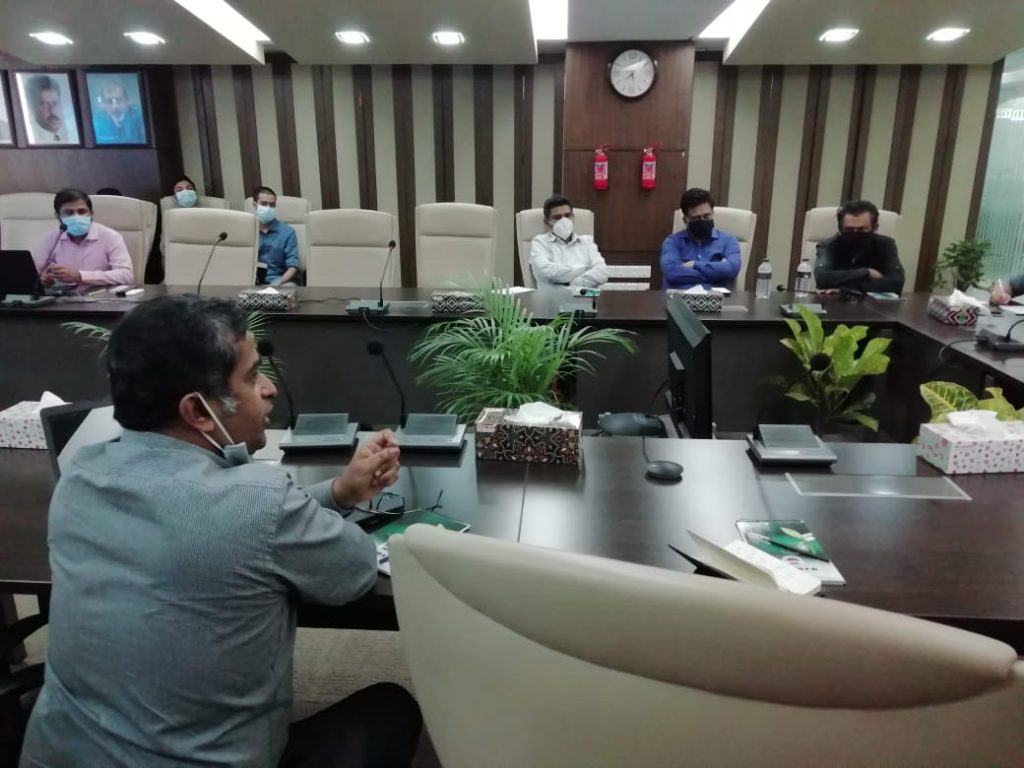A high level meeting between leaders of knitwear sector under Bangladesh Knitwear Manufacturers & Exporters Association (BKMEA) and recently appointed Bangladesh Ambassador to Uzbekistan Mr Zahangir Alam was held at BKMEA Dhaka office on 17 September, 2020. The meeting was initiated and organized by Mr Mehdi Mahbub, Advisor to Uztextileprom (Uzbekistan Textile Association/ Ministry) and President of Bangladesh RMG Centre. Acting President/ 1st Vice President of BKMEA Mr. Mohamad Hatem presided over the meeting and several members of the Board of Directors of BKMEA attended. The collaboration scopes and business opportunities in Uzbekistan for Bangladesh apparel industry were discussed at length during the meeting.
In his opening remark, Mr. Mohamad Hatem, one of the most prominent knitwear business leader who himself visited Uzbekistan last year as a senior member of Bangladesh Commerce Minister led business delegation, informed the Ambassador about the business realities and possibilities of doing business in Uzbekistan. Mr Fazlee Shamim Ehsan, the immediate past Vice President of BKMEA who was also an entourage of the Commerce Minister, vividly explained his experience and understanding on business possibilities in Uzbekistan. BKMEA leaders have expressed their opinion on the setting up of a central warehouse in Bangladesh to stock Uzbek cotton and yarn. This would help Bangladeshi manufacturers to reduce the lead time and hassle of import from land-locked Uzbekistan and thus reduce the manufacturing cost by ensuring prompt availability of raw materials and the elimination of the middlemen. This would be win-win for both countries certainly. BKMEA leaders also shared their interest to explore Uzbekistan as a possible manufacturing location for Bangladesh knitwear sector’s interest to diversify its global market. The Bangladesh Ambassador appreciated business leaders and assured to support from his end after discussing with concerned authorities in Uzbekistan upon he took over his ambassadorial responsibility in Tashkent.

Mr. Mehdi Mahbub pointed out that in order to form a good business backbone for Bangladeshi apparel industry in Uzbekistan, the two governments need to work together. Since the current Uzbek government under the leadership of President Shavkat Mirziyoyev, as well as Uztextileprom under its Chairman Ilkhom Khaydarov, are very keen to attract foreign investors to Uzbek apparel and textile sector, Mr Mehdi opined that Bangladeshi industry leaders should explore possibility to set up manufacturing facilities in Uzbekistan, considering the fact that Uzbekistan is world’s 4th largest cotton producers and nearer to Russian/ CIS markets. Although historically known for cotton export, Uzbekistan now focus on value addition by manufacturing and exporting finished products from Uzbekistan.
Russia and the CIS (former Soviet Republics) constitute a huge potential market for Bangladeshi apparel industry. According to industry experts, this is a 50-billion-dollar market that is still largely untapped by Bangladesh. The principal barrier for Bangladesh export to Russia and other CIS countries are double taxation and high export duty. On the other hand, 44% of Uzbek export goes to Russia and CIS countries by availing special duty advantage and geographical proximity. Moreover, the countries enjoy duty-free access among themselves. All of these factors make Uzbekistan a brilliant prospect for Bangladesh as this will open up business opportunities in the entire region.

Mr. Mehdi Mahbub conducted a presentation on the Uzbek apparel industry, prepared by Uztextileprom where it explored the different aspects of the countries apparel industry in detail.
In his remark, H.E. Zahangir praised the business leaders and industry experts for their hard work to keep Bangladesh’s economy afloat. He also addressed them as the “ambassadors of Bangladesh”. He expressed his desire to see himself as the ambassador of a middle-income to a developed Bangladesh and put emphasis on the role of the apparel sector to play its role to achieve the goal for the country.
The Bangladesh Ambassador designate to Uzbekistan also emphasized the importance of healthy bi-lateral agreements between the two countries which would be beneficial for both country. He also mentioned that since both Bangladesh and Uzbekistan do have strong bondage due to religious and cultural connections for thousand years, other sectors such as tourism, agriculture, education could be bolstered positively. He also informed the business leaders about the possibilities of using Chabahar port of Iran, which could be more convenient for Bangladesh-Uzbekistan trade. Chabahar is located in southeastern Iran, on the Gulf of Oman, closer to Pakistan/ South Asia. The port offers less port handling charges than Bandar Abbas. Chabahar has good connection to other central Asian countries including Uzbekistan by rail.
Both Bangladesh and Uzbekistan have so much to offer each other, not just in the apparel sector, but also in leather, food, and tourism industries, to name a few. People from Uzbekistan, a double land-lock country, can enjoy the longest sea beach in the world in Bangladesh as well as the largest mangrove forest Sundarbans. On the other hand, Bangladeshis can enjoy visiting the beautiful mosques, mausoleums and other Muslim architectures in Uzbekistan, taste their traditional Plov and kabab. The business leaders mentioned the importance of establishing a direct flight between Tashkent and Dhaka as well as on arrival visas for Bangladeshi visitors, which would greatly benefit both countries. H.E Zahangir Alam apprised the BKMEA board of his discussions with Bangladesh Civil Aviation & Tourism Ministry and Biman Bangladesh Airlines. He is optimistic that in future there would be direct flight in between Dhaka and Tashkent which would be helpful for the growth of business for both Bangladesh and Uzbekistan.
The discussion ended on high notes from the participants that the future business prospect for Bangladesh and Uzbekistan is brighter and appropriate measures should be taken to explore untapped opportunities for both countries’ interests.
















